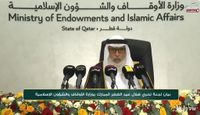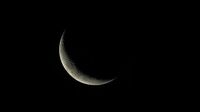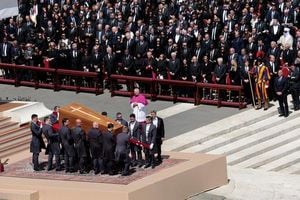The Moon Sighting Committee of the Ministry of Endowments and Islamic Affairs in Qatar has officially announced that Sunday, March 30, 2025, will be the first day of Eid al-Fitr. This declaration came after the committee convened on Saturday evening, March 29, to sight the crescent of the month of Shawwal.
In a statement released following their meeting, the committee expressed hope that Allah would accept the fasts and prayers of those who observed Ramadan with faith and accountability. The committee also extended warm greetings to the Emir of Qatar, Sheikh Tamim bin Hamad Al Thani, as well as to the people of Qatar and all Muslims worldwide, wishing them blessings during this festive occasion.
While Qatar and several other nations, including Saudi Arabia, Bahrain, Kuwait, Yemen, the United Arab Emirates, Palestine, Lebanon, and Sudan, have confirmed that Eid will be celebrated on Sunday, other countries have taken a different stance. Egypt, Syria, and Jordan, for instance, announced that Monday, March 31, 2025, will mark the first day of Eid al-Fitr due to the inability to sight the crescent moon on Saturday evening.
This discrepancy means that Ramadan will last 29 days for those celebrating Eid on Sunday, while it will extend to 30 days for those observing it on Monday. The different conclusions drawn by these nations stem from their respective moon sighting committees and religious authorities.
The announcement from the Saudi Royal Court referenced a ruling from the Supreme Court regarding the moon sighting, while in Qatar, the declaration was made in accordance with the Ministry of Endowments and Islamic Affairs. In Kuwait, the decision came from the Sharia Vision Authority, and in the UAE, it was announced by the Presidential Court. Similarly, the Sharia Authority in Bahrain confirmed the sighting of the Shawwal crescent, while in Palestine, it was the Grand Mufti who made the announcement.
In contrast, the official Oman News Agency reported that the moon sighting committee there declared that Sunday would be the last day of Ramadan, with Monday being the first day of Eid al-Fitr. This was echoed in Syria, where the chief judge in Damascus, Ahmad Muhammad Hamada, confirmed the sighting, and in Iraq, where the Sunni Endowment Bureau made a similar announcement. The Jordanian Ifta also stated that Monday would be the first day of Eid al-Fitr.
The differing dates for Eid celebrations across the Arab world illustrate the importance of moon sighting in Islamic tradition, as it is a practice deeply rooted in the cultural and religious practices of Muslim communities. The sighting of the moon marks the end of Ramadan, a month dedicated to fasting, prayer, and reflection, and the beginning of Eid al-Fitr, a time for celebration, family gatherings, and charitable giving.
As the festivities approach, many families are preparing for the holiday by shopping for new clothes, decorating their homes, and planning meals that will be shared with loved ones. Eid al-Fitr is often marked by communal prayers, feasting, and the giving of gifts, particularly to children, who look forward to receiving new clothes and sweets.
In Qatar, the government has encouraged citizens and residents to participate in the celebrations while adhering to health guidelines to ensure the safety of all during the ongoing global health situation. Authorities have emphasized the importance of maintaining social distance and following health protocols during large gatherings.
The spirit of Eid al-Fitr transcends borders, bringing together Muslims from various countries and cultures. Regardless of the date of celebration, the core values of generosity, compassion, and community remain at the forefront of the festivities. Families often take this opportunity to visit the graves of loved ones, reflecting on the importance of remembrance and gratitude.
As communities around the world prepare to celebrate Eid al-Fitr, the joy of the occasion is palpable, with many looking forward to reconnecting with family and friends after a month of fasting and spiritual reflection. The essence of Eid is not only in the joyous gatherings but also in the shared values of kindness and charity that are integral to the celebration.
In conclusion, Eid al-Fitr serves as a reminder of the significance of faith, family, and community, uniting Muslims across the globe in a shared celebration of gratitude and joy.






